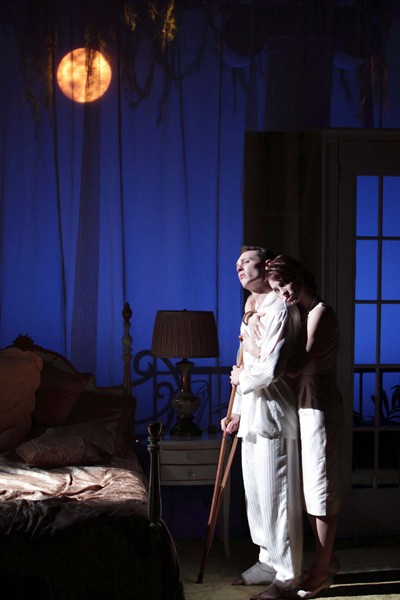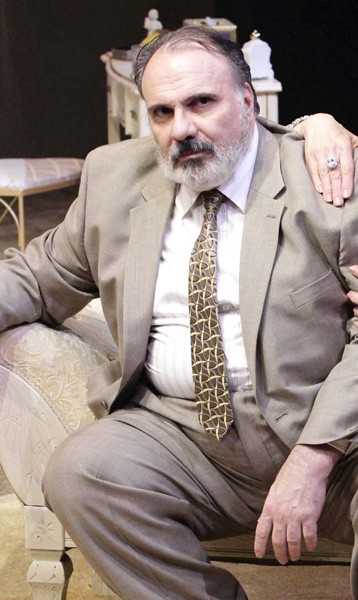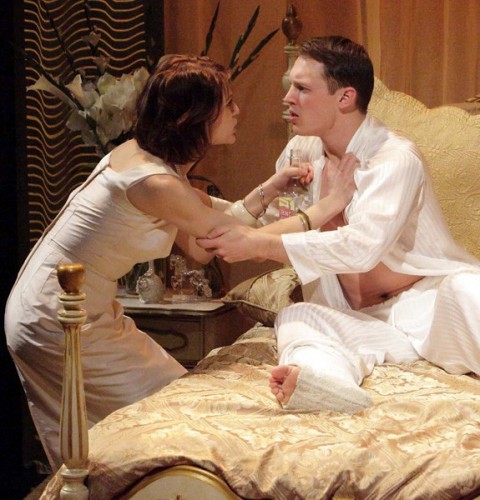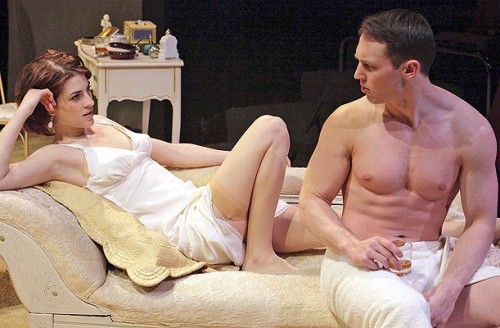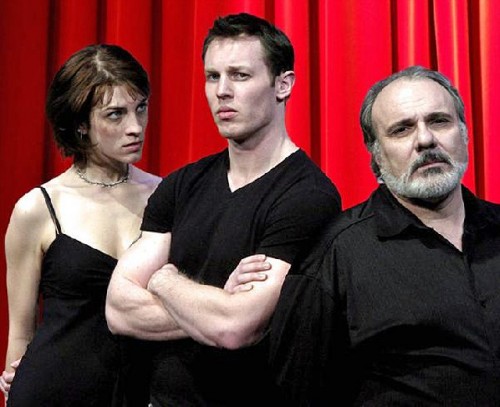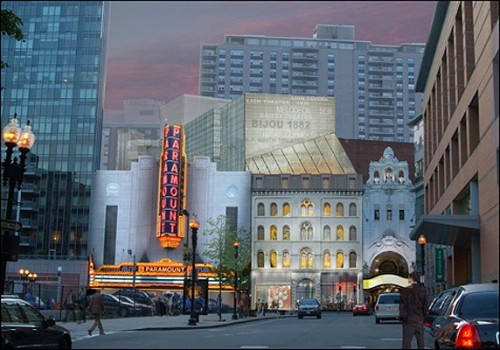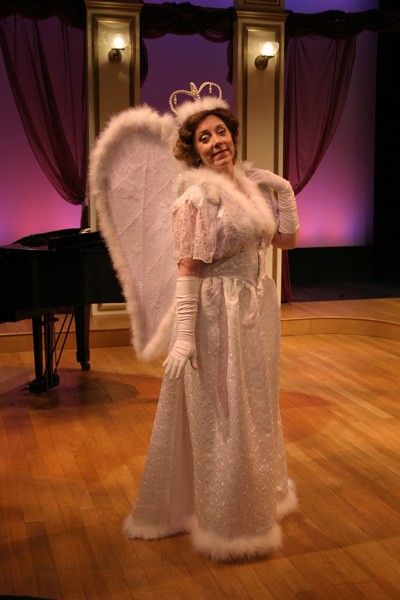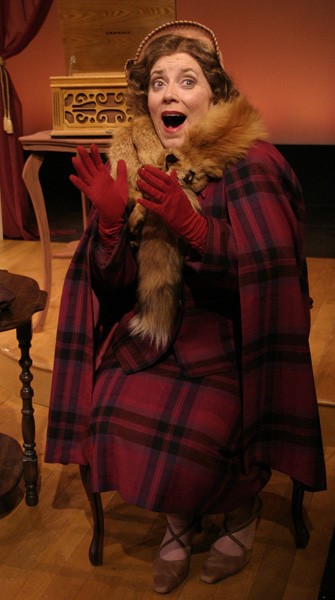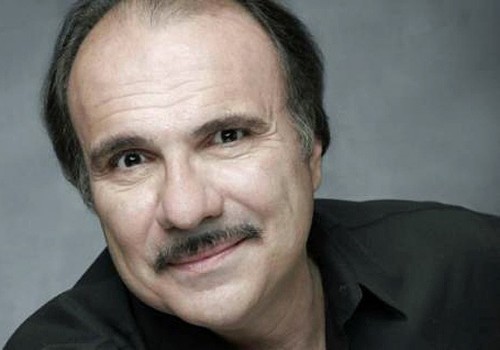The Big Daddy of Boston's Resident Theatres, Spiro Veloudos
Lyric Stage Hits New Heights Under His Leadership
By: Larry Murray - Mar 07, 2009
It has been nine years since the actor Spiro Veloudos last appeared onstage in Boston, but it wasn't until I saw him stride on stage as "Big Daddy" in Cat on a Hot Tin Roof that I realized just how much his presence has been missed. The current Lyric Stage production is about as close to perfect as a live performance can be, and you should move heaven and earth to see it before it departs in another week. The play is a winner.
Under the watchful eye of director Scott Edmiston, it seems as if every tiny detail was arranged so as to sear this story of treachery, deceit and false love on a Southern plantation into the memory. The acting, the set, the costumes, the lighting, the sound - everything is so seamless you come to feel that you are not in a theatre, but an observer in the genteel house of a very dysfunctional family, watching some pretty outrageous goings-on.
So who is Spiro Veloudos, and why should you care? Beyond being a truly gifted actor, he is literally a larger than life arts entrepreneur who holds one of Boston's oldest theatre companies together. When he walks into a room, his presence is felt even if you don't see him at first. He is a cautious administrator, but unafraid to take artistic risks. He constantly shines the spotlight on his staff, and insists they be credited for his successes, and cares deeply about his theatre family. On stage and off, Spiro is a leading voice of Boston theatre, yet never acts like one. He is, above all a gentleman.
Letting Veloudos know I was on my way, he arranged for us to meet up. I brought along my tape recorder. Herewith our frank conversation about the nuts and bolts of running a local theater company, and his candid views on the future of theater in a troubled world.
LM: I've always wondered, is Lyric Stage the oldest theatre company in Boson?
SV: Actually, the Publick Theatre is a little older. They began in 1970, Ron Ritchell and Polly Hogan began Lyric Stage in 1974. I joined the Publick in 1975 but through a twist of fate, I have also been involved one way or the other with Lyric Stage since its early days. I knew Polly from Emerson when I was an undergraduate there, and the first production I directed for them was - oddly enough - Cat on a Hot Tin Roof - on Charles Street.
LM: The Lyric's original second floor walk up space.
SV: That's right, the theatre above the hardware store.
LM: Tiny claustrophobic little place.
SV: Ron and I were walking back from an Arts Boston meeting at your office when he made the offer, and that was in 1985. Not being shy, I took it on, and after Cat, from then on I directed 1-2 shows a year for Lyric. Then the company moved to this building, the YWCA, in 1991. I directed American Buffalo in 1992, and from then on at least one show a year until Ron and Polly stepped down in February 1997.
LM: Did you inherit their board?
SV: Some of the board is still the same, but it is almost a different company now with its own hard working board. They are preparing a strategic plan for the next five years right now.
LM: What can you tell us about that?
SV: The process hs just begun, so nothing is decided yet, but we have been looking at a number of artistic things I would like to do that the limitations of the current space will not allow. We are exploring creating shows with other organizations, possibly in partnership with a college or university. Together we could undertake larger projects that require more space and greater forces. I like the idea of collaboration as do they, and sometime in the near future the opportunity may present itself.
A perfect situation is to undertake a new work with another company and share the production costs. But that can also be somewhat dangerous if you do not have a long trusting relationship with your partner.
LM: You mean artistic conflicts?
SV: More than that, there has to be financial trust as well. There are Bernie Madoff's in the arts as well as investment houses. For example, there was the disastrous partnership between Atlanta's Theatre of the Stars and the American Music Theatre of San Jose to produce Tarzan. This collapsed in late 2008 when the Atlanta group announced they were not going forward with the show, and that some $1.7 million from San Jose had been spent for a different production that tanked. The money was all gone, used up on their failure, and the San Jose company was forced to go into Chapter 7 bankruptcy as a result. The lawsuits are underway. So one has to be very careful.
LM: What a story. Boards are smart to know their collaborators and to exercise due diligence.
SV: One of our explorations is with Emerson College which is about to renovate the Paramount Theatre.
LM: That 145,000-square foot Paramount Center Project is a biggie. The $77 million restoration and repurposing of two old buildings would bring some sense of completion to the old Midtown Cultural District Plan so many arts people spent years working on with the Boston Redevelopment Authority back when Ray Flynn was Mayor. The Emerson plans I have seen show a 500-seat concert hall, a black-box theater, a film-screening room, numerous rehearsal rooms, a scenery-making shop, a ground-floor restaurant, and housing for more than 250 students in the old Colonial Building on Boyston Street.
When all is said and done, the complex at 543–547 Washington Street — the Paramount Theatre, and the so-called Levin Arcade Building next door (home to the old Boston Bijou Theatre) — will be given new life. Emerson has turned out to be the answer to a city's prayers for that area. With the Opera House that was renovated earlier, that block is looking pretty good.
SV: We are talking with them about how that facility might be used by other companies, much like the Emerson Cutler Majestic (the old Sack Savoy movie theatre) is leased out to nonprofit groups. There are lots of possibilities, but nothing concrete.
This refurbishing is a major undertaking and we have yet to see what role the economy might play in its completion.
LM: Spiro you - and Ron Ritchell before you have been Lyric's reliable steam engines that just keep the company chugging along. When you run a theatre company, you have enormous responsibilities - in your case, you act, you direct, you administer and fundraise - isn't it overwhelming at times?
SV: When I got here in 1997 Lyric was organized with an artistic director and a managing director. As it turns out, the managing director soon left and I became the "producing artistic director." I not only did the artistic job, but also administered, worked with the bookkeeper, wrote checks etc. Four years ago it became apparent that one person simply couldn't handle all of these responsibilities. There was natural friction between the business and artistic sides, and with me in both roles, the artistic director nearly always won.
LM: I bet that pissed off your business side.
SV: It certainly was not the ideal setup. So I approached the board about funding the position of managing director, and after a search, Sara Glidden was brought aboard. We had worked together years ago at the Publick Theatre, she had great credentials from Emerson, and the board picked her over three other super candidates. For me, it was a natural progression and a great choice. She has helped us grow.
LM: I see Lyric Stage now has a $1.2 million budget, great earned income, a substantial donor base and most important of all - solvency. How did you accomplish that?
SV: Well, it's not me so much as a strong board, great staff, and a solid base of supporters. We have twin goals - putting on great shows and long term survival . One reinforces the other. We are watching the current economic situation with a wary eye towards next season. Right now we are not yet feeling much in the way of tremors from the economic collapse to be honest. And part of that is the fact that our subscription campaign was done prior to the meltdown. We wound that up in September, and the real trouble didn't surface until late September, early October. So far, our single ticket sales have not seen any drastic drop, in fact every show this year has done better than its projections. But the year still has time to run.
LM: Could part of that be the shows that you have been choosing?
SV: Certainly that's a factor that can't be under-rated. Programming is everything. But no matter how well you pick, if people do not have disposable income, they are not going to go out. They say that the arts are the first thing to be cut and the last one to return.
In terms of budgets smaller theaters may be at an advantage. Broadway tickets, and big traveling shows are often priced in the hundred dollar range, but someone like Lyric is far more modest in cost - perhaps $25-50 for full price tickets with discounts on subscriptions and day of performance tickets if any are left.
LM: You might be benefiting from people's frugality.
SV: Local theaters become sensible entertainment choices in tough economic times. Still, we are reading about our sister companies around the country who are having problems, and even Massachusetts companies are facing dire choices.
LM: North Shore Music Theatre and Worcester Foothills are in very deep financial holes.
SV: Yet we are faring ok. While Lyric has always been artistically daring, these are the times it pays to be fiscally conservative.
LM: Something else has been going on, too. For several decades the work of ART and Huntington has been a cut above the smaller resident groups. But recently the work of the Lyric and others has started to challenge the bigger guys in both quality and critical response.
SV: I think the equation has changed, especially in the past ten years. Now, artistically, the upper tier has to include not only ART and Huntington, but the New Rep, SpeakEasy and Lyric, and not far behind are a handful of other new, vibrant companies which are rising fast. I used to think of Lyric as the largest of the small companies, but lately I am starting to think we are the smallest of the big companies.
LM: Boston audiences are getting to see new works much more quickly than ever before. You've picked a couple of very interesting works to follow Cat on a Hot Tin Roof - Grey Gardens for one, very New England.
SV: I saw its debut in New York with Christine Ebersole about two years ago and thought the story of the Beals and the Bouviers was fascinating, it ties in with the Kennedys, and the two characters, Edie and her mother are extremely well drawn. Looking into the documentary film by David and Albert Maysles, it became irresistible.
LM: I wonder if the Maysles had any idea that what they were capturing on film was lightning in a bottle.
SV: I don't think they did. They had a tiny budget, did all the filming themselves, and while it quickly became a cult favorite, it certainly was never shown in the multiplexes. In fact it didn't catch on until it was released on DVD. They recently issued an addendum "The Beals of Grey Gardens" which has some of their out takes. Recently I learned there is a Drew Barrymore-Jessica Lang film version in the works for HBO which will be a dramatic, not musical version of their life.
LM: So who did you cast as Edie?
SV: Leigh Barrett will be playing Edie.
LM: Wow, she's the first lady of the Boston musical stage. She was spellbinding in Souvenir as Florence Foster Jenkins. And what about the musical forces?
SV: We are going to have a pit orchestra of eight or nine players.
LM: Eight or nine! That's pretty amazing for a small house.
SV: That's pretty standard for us. Jonathan Goldberg is the music director here, and he is a great arranger and knows how to make a handful of instruments sound like many more. When we did 1776 he found the arrangement from the New York revival which was scored for six musicians. In other cases he re-scores a work to give it added punch and dramatic effect. In a city where musicians often float from gig to gig, he has also been able to keep most of our players throughout the run which greatly enhances the final result.
LM: Very impressive.
SV: We like to keep the audiences coming back.
LM: And directing Grey Gardens?
SV: Me.
LM: You are a glutton for punishment. Everyone's going to be comparing it to the original. And in between Cat and Grey Gardens?
SV: A new play called Speech and Debate. It was written by Stephen Karam when he was a student and had its first production at Brown University. Since then it has played the Roundabout Theatre in New York to amazing reviews. It was extended three times to meet the demand for tickets.
LM: Sounds like this playwright is off to a good start.
SV: I saw the Roundabout production, liked it, and one of my friends knew Stephen and approached him on our behalf, and so we will give it its Boston premiere. Jeremy Johnson will be directing. It's a great story about three high school students who are outcasts from the mainstream. One wants to be a journalist and has a secret he holds in. A young woman, Delilah, wants desperately to be in the musical but is never cast, and there is Howie, who is openly gay and is trying to start a gay-lesbian alliance. The three join forces to form a speech and debate club so their voices can be heard. It is very thought provoking and yet quite funny.
LM: Do you see any new women playwrights or plays on the horizon. Theresa Rebeck. Tina Howe, Mary Zimmerman in particular...
SV: You read my mind. For next season we are looking at two new women's voices, possibly four. Stay tuned.
LM: I was surprised that you passed on Jerry Springer: The Opera which is getting its New England premiere at SpeakEasy Stage this May. I can hardly wait to see the Ku Klux Klan doing their song and dance number,
SV: I saw it in London, and think one of the reasons the Brits liked it so much is that they love to laugh at the foibles and low taste of Americans.
LM: It certainly spoofs our taste for low-brow television, perhaps that is why I am so enthusiastic.
SV: It's quite a coup for Paul Daigneault whose company focuses on these premiere productions.
LM: Like David Harrower's Blackbird which I just saw.
SV: Exactly. He's directing Jerry Springer, and there's no doubt he will do a wonderful job. It should be a fun evening of theatre.
LM: You clearly don't mind the competition.
SV: Not at all. Our real competition is indifference and inertia, and all the theatre companies are trying to get people to go out more. The real challenge is finding more ways to get younger audiences to turn out. Today there is so much to keep people amused, from videogames to FaceBook and MySpace. It's a real challenge and I don't think we've yet found the key to unlock the holy grail of audiences.
Between all of us, we do a lot of programming to interest younger audiences but have yet to find a way to turn them into subscribers. Perhaps it's just habit, but the older demographic will subscribe, while the younger crowd likes to sample everything on the buffet, if you will. Even so, our subscription base is growing, and that's good news. It's gone from 1700 to 2500. Happily most people pick the seven show package, which translates into a great base of support for each show we produce. (The Lyric Stage space holds about 240 people.)
Larry, you remember the dark days in Boston theatre when it was hard to make a living. Things have improved to where an actor can survive, even if their gigs are spread between several theatre companies. An actor, with four or five shows a year here, at NewRep, ART and a little teaching can actually pay their bills.
As a result, we see graduates from BU and Emerson staying in Boston for a couple of years, gaining experience and earning their bona fides, and this has greatly enhanced the quality of our work. Surprisingly we are finding more middle aged actors as well, since local theatre finally has a real presence in the community.
LM: When I came to Boston in the early 60's there was hardly any activity. There were some Broadway road shows and tryouts, some student stuff at Harvard but not a lot. Mostly it was the Theatre Company of Boston and an acting company at the old Charles Playhouse. Michael Murray and David Wheeler. And they were always broke. Those were tough days, we still had a City Censor, Richard J. Sinnott. He was technically the head of the licensing board but he made doing theatre in Boston a living hell. And if he was otherwise occupied, there was always Dapper O'Neill. There were secret riders on all the theatre contracts. Al Pacino ended up performing Richard III at the Church of the Covenant on Newbury Street, not a real theatre. Stange Interlude was banned in Boston and played in Quincy. Lots of stories as you know. It seems we have finally gotten over that era.
SV: So much has changed in the intervening years. Now there is a core of companies that have their own homes, or can depend on being resident companies at shared facilities. There was a time when the Boston Center for the Arts had only one black box space, and now it has four great spaces that are always booked.
LM: We have to thank the Huntington Theatre Company for two great venues at the Calderwood Pavillion at the BCA. Somehow in the midst of the real estate boom, a few theaters actually got built.
SV: The critical environment has improved as well, and whether the reviewers buried the hatchet or we just got better is arguable. No longer is all local theatre greeted with negativity. When there is something good, they report that, When something doesn't measure up, they report that too. That is the way it should be.
LM: I lived through that when I was with the Pocket Mime Theatre. I think one reviewer who will go nameless always sharpened his ax when he arrived in hopes of killing as many of the local theatre companies as he could so he wouldn't have to cover them.
SV: Yes, those times are gone.
LM: I was impressed at how many people have reviewed Cat on a Hot Tin Roof.
SV: I am impressed too, and I know I haven't seen all of them.
Especially impressive is that so many folks out in the Berkshires took an interest. The resultant buzz on the street is bankable, and it looks like our last two weeks will be close to a sell-out. The audiences have been enthusiastic, and much credit has to go to the actors and the director, Scott Edmiston, who did a masterful job. The performances are wonderful, and the set design is just magnificent.
LM: And I knew all that before setting out for a weekend in Boston. The internet is a wonderful thing in terms of spreading the word.
SV: We had a Tennessee Williams fan e-mail from Ireland that he wanted to see our production, and we arranged the hotel room and so forth, and it is clear the impact of digital magazines like yours is just starting to take hold, as the print media begins to fade. Soon it will be a different world out there.
Still, I may get the Daily Boston Globe and New York Times on my Blackberry every day, but on Sunday I want the real thing, all three or four pounds of it. There is nothing more pleasurable than curling up with the real thing.
The writers have become more sophisticated, especially ones like Louise Kennedy at the Globe, and they have not been afraid to encourage audiences to be a little more daring and to go out on a limb to recommend plays that may be more difficult. That has been a very good thing for Boston theatre.
LM: Spiro, why don't you put on your fortune teller's hat and tell us what you see in the future for theatre...
SV: The trend to shorter plays has already begun, and many will be multi-media based. More projections, more sound design, more complex lighting. The actor will always be the key component, but the tools of sets, lights, costumes will greatly expand. Just as on the internet things have become more media rich, on stage the same thing is happening. It's not enough to just amplify a voice if needed. With everything from home theaters to the latest films having Dolby 5.1 or THX surround sound, theaters are beginning to be more than just a stage, they are becoming environments.
LM: The awful musicals Cats and Starlight Express were two of the first shows to embrace this, as did Rent when it transferred to Broadway using an old, run down theatre.
SV: In time you won't go to just see a play, you will go to experience it. Perhaps there will be more than just one thing happening on stage at the same time, breaking a cardinal rule of good theatre, but we may live to see it turned on its head.
LM: I consider the multi-level theatricality of Cirque du Soleil productions to be doing that already. They have proved audiences can take in a lot more than once thought. Multi-tasking theatre may have aleady arrived.
SV: That's possible. But I don't think the heart of theatre is going to change, which is good storytelling. The stories may get a little shorter to accommodate the shortened attention span. In the 1940's and 1950's most plays were two or three hours long with generous intermissions. Intermissions were important for concession sales which in turn provided profits. When we decide to do a play without an intermission, our ancillary income suffers, but that is the new reality. Many plays are being constructed these days without a break, and so the running time is under two hours.
Of course there is always the exception. August: Osage County comes to mind. While it runs more than three hours long, it felt like it flew by in minutes.
LM: What about storytelling. Some prognosticators say that this form of communication is dated, that snappy repartee and snarky exchanges are the new communication.
SV: You will always need the device of a story to keep someone's interest for more than a few minutes. In the end it is an actor, the story and the audience that make theatre so meaningful. In Cat on a Hot Tin Roof it is a discussion of homosexuality even though that specific word is never used. Without this story element, the tensions between Margaret, Brick, Big Daddy and others would be far less powerful. A good story is at the heart of every good play. That's why Cat on a Hot Tin Roof sizzles on stage. It has real tension, real conflict.
LM: Perhaps that is why most audiences find the play far more spellbinding than the film, even though you don't have Paul Newman and Elizabeth Taylor on stage. Tennessee Williams himself was unhappy with the film, it was not at all the play he wrote.
SV: Theatre has always taken on the tough subjects, well before film or television, or even the newspapers. A good play allows the luxury of time for a proper exploration of unfamiliar or rarely talked about subjects. Theaters are still where people gather to hear a story, to learn about the legend, to unravel the mysterious, just as they did around the campfires, or in the Roman arenas. No other medium does it as well. You can't build dramatic tension if the story keeps getting interrupted with commercials or product placements.
LM: It's been years since you were on stage. I think the last time I saw you act it was at the Publick Theatre. How does it feel?
SV: Very scary. I haven't acted in nine years, and I have only acted three times in the last fifteen years. The most recent break was the biggest gap ever for me. With so many other responsibilities I hadn't even thought of acting in recent years until Scott asked me. Picking up the lines was a little difficult, and I have to work on them every day. One of the great things about a long run like this is the degree of consistency you can develop, but it takes real discipline.
LM: Do you think people have any idea how really difficult it is to learn a role and try to create something pretty close to identical night after night?
SV: It's very difficult. My primary scene partner is a young actor, Kelby Akin (who plays Brick) who recently graduated from the Brown/Trinity Rep Consortium in Providence and is very supportive and giving of his colleagues on stage. And to call an actor who plays Brick "very giving" is unusual, since his job is to be this solid wall in the play which nobody can move. Not even Georgia Lyman, a beautiful, sexy and smart actress. Her character of Maggy is all of those things, and then some. She is wonderful.
This play has been in the works for five years and although Director Scott Edmiston asked me to play Big Daddy, I had never given that role much thought. Now that I have immersed myself in it, I wonder why I never thought of doing it before. It really fits me like a glove. Of course, acting is taking time away from my other duties, so the entire staff has pitched in to take up the slack. I am glad I said yes to Scott.
A Final thought
Back in the Berkshires, and having seen Spiro on stage in that role, I am glad he said yes as well. His talents both on and off stage seem to know no limits.
That is why I consider Spiro Veloudos to be the "Big Daddy" of Boston Theatre.
Quick Link to Lyric Stage Company

